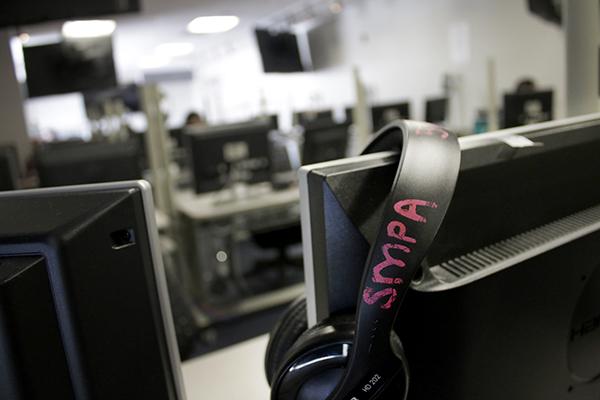
The School of Media and Public Affairs hopes to launch a new curriculum focused on data-driven storytelling next fall, responding to the rising demand for employees with data skills at news organizations and communication firms.
An undergraduate curriculum committee spent about eight months working on the overhaul, which the Columbian College of Arts and Sciences must approve. Kimberly Gross, the school’s associate director, said core requirements would now include a digital skills course and a second research methods class to give students the tools to design research projects and perform big data analysis.
The school wants to require students to take two digital media introductory courses: one that aims to make them more web savvy and another that centers on video production. Previously, a single class covered shooting and editing techniques as well as HTML, one of the most basic coding languages.
SMPA’s director, Frank Sesno, said he has steered the school toward a focus on data and new technology, an effort to help graduates beat the odds in an unsteady job market.
Employment numbers in journalism and mass communication have plateaued, according to a 2013 report by the University of Georgia’s Cox Center that compared data over two years.
In the spring, Poynter identified 37 core skills that it found journalists needed to be successful. The list included the ability to interpret statistical data and graphs as well as basic audiovisual, coding and editing skills.
“We’re all storytellers, but how do you compel readers? Data is one way,” said Sesno, who is CNN’s former D.C. bureau chief.

Gross said there was not enough room in the school’s one introduction to media production class “to create the baseline of the various skills you need for jobs” in the journalism and political communication world.
If approved, the school’s mandatory media ethics course will be available to juniors majoring in journalism and mass communication – instead of only seniors – for the first time. Only one internship instead of two will be able to count as a skills credit, and as a capstone, SMPA will require seniors to take a four-credit multimedia workshop.
Students in both majors must now take introduction to political communication and journalism, theory and practice, but if the changes go into effect, they will only be required to take the theory course that is in their major.
Gross said the updates would allow students to better focus on their chosen area of study and make room for more courses in their schedule that emphasize skills rather than theory. Faculty will take the rest of the year to discuss exactly how to modify each course, she added.
SMPA’s changes follow those of many journalism schools across the country. The Annenberg School for Communication and Journalism at the University of Southern California opened a separate journalism school this year and houses centers that focus on social and digital media.
Northwestern University’s Medill School of Journalism has a digital and database research center and Syracuse University’s S.I. Newhouse School of Public Communications will dedicate their new Newhouse Studio and Innovation Center later this month.
SMPA boasts its own Center for Innovative Media, but does not offer as many programs as their fellow media schools.
Medill and Newhouse are often included in lists of the top journalism schools in the country, but SMPA is rarely grouped with them.
Gabriel Knapf, a professor at the Annenberg School of Communication, said journalism schools must cover more diverse topics in the classroom if they hope to grow.
“We have an opportunity to tell stories in a different way,” he said. “The whole narrative is changing, and using data to do that is one way but a very powerful way, and we can apply that and extend beyond traditional journalism.”
David Karpf, a political communications professor at GW, said all faculty will attend a retreat later this month to exchange teaching tips. At past gatherings, faculty would help develop big picture ideas for the school.
The new curriculum reflects a realignment of goals, Karpf said.
“It’s less of a course change than sort of a refinement,” he said. “We took a look at what we are offering, what are similar programs other universities are offering, and how we can better serve undergraduates who take these courses.”
This post was updated to reflect the following corrections:
The Hatchet incorrectly reported that a committee spent 15 months working on proposed changes to the SMPA curriculum. The committee only met over the course of eight months. The Hatchet incorrectly reported that SMPA would offer a coding course. The school plans to offer a digital skills course that will teach several web skills, including coding. The Hatchet also incorrectly reported that the ethics course would be a senior seminar. It would be a required course that juniors could take. The Hatchet incorrectly reported that both political communication and journalism and mass communication majors wouldn’t need to take introduction to news writing. Both majors would still have to complete the class. We regret these errors.







